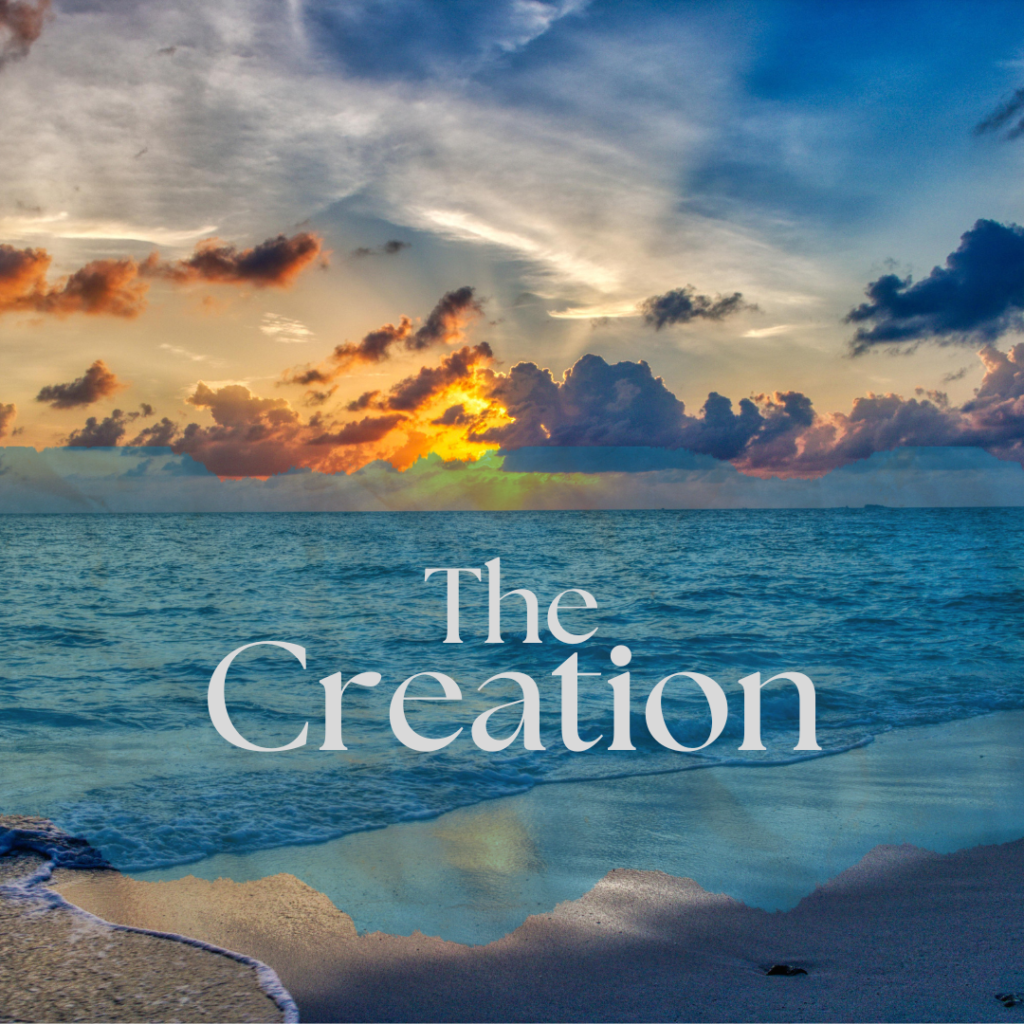 There are many, many versions of the Creation Stories, as they have been told by various cultures. In this post, I will compare the creation story that is recorded in the Biblical Book of Genesis to that of the Ancient Greeks, who did not have a main book, like the Bible. To assimilate my account of the Ancient Greek Creation Story, I had to read several Ancient Greek Myths and piece them together. I readily admit that there are many conflicting Ancient Greek Myths. Many scholars will dispute what I am juxtaposing and calling an Ancient Greek Creation Story. But I don’t believe that anyone has any certain knowledge, in regard to Greek Mythology. With that in mind, I’ll continue.
There are many, many versions of the Creation Stories, as they have been told by various cultures. In this post, I will compare the creation story that is recorded in the Biblical Book of Genesis to that of the Ancient Greeks, who did not have a main book, like the Bible. To assimilate my account of the Ancient Greek Creation Story, I had to read several Ancient Greek Myths and piece them together. I readily admit that there are many conflicting Ancient Greek Myths. Many scholars will dispute what I am juxtaposing and calling an Ancient Greek Creation Story. But I don’t believe that anyone has any certain knowledge, in regard to Greek Mythology. With that in mind, I’ll continue.
Berens,
Read The Myths and Legends of Ancient Greece and Rome by E. M. Berens free at Gutenberg.org:
https://www.gutenberg.org/cache/epub/22381/pg22381-images.html
Watch the following YouTube video to better understand what I’ll say in this post.
Busnel, François. “Zeus and the Conquest of Power.” YouTube, 2015, www.youtube.com/watch?v=OCHfg-6klVU&t=68s.
What Is A Myth?
“Myth is an oral story, symbolic, dynamic, and apparently simple, of an extraordinary event with transcendent and personal referents… Myth seeks out the original meaning of the world; it wants to know. A stone in the middle of the desert, the reproduction of a rare species, or human life, require an explanation that can satisfy the thirst for knowledge. Myth considers and interprets events in space and time, especially those that are furthest-removed. Paradoxically, only in this way does myth also comprehend the present. Like empirical science, but in a different way, myth gives sense to the world through causes and effects. All myth is an etiology.
“When myth explains origins or a new beginning, it expounds a cosmogony….
“Each cosmogony, in turn, can be more or less general: It can explain the origins of the universe, of the gods, or of men.” (Losada).
Losada, José Manuel. “Myth and Origins: Men Want to Know.” David Publishing Company, Oct. 2015, www.davidpublisher.com/Public/uploads/Contribute/562870b08884b.pdf.
“Myth seeks out the original meaning of the world; it wants to know. A stone in the middle of the desert, the reproduction of a rare species, or human life, require an explanation that can satisfy the thirst for knowledge. Myth considers and interprets events in space and time, especially those that are furthest-removed. Paradoxically, only in this way does myth also comprehend the present. Like empirical science, but in a different way, myth gives sense to the world through causes and effects. All myth is an etiology.”
I have heard the Creation Story in Genesis all my life, and that story has been recorded in the Bible for many, many years. As a type of framework, I’ll follow the Biblical story, almost verse by verse, and I’ll compare it with what I believe are similar stories from the Ancient Greeks.
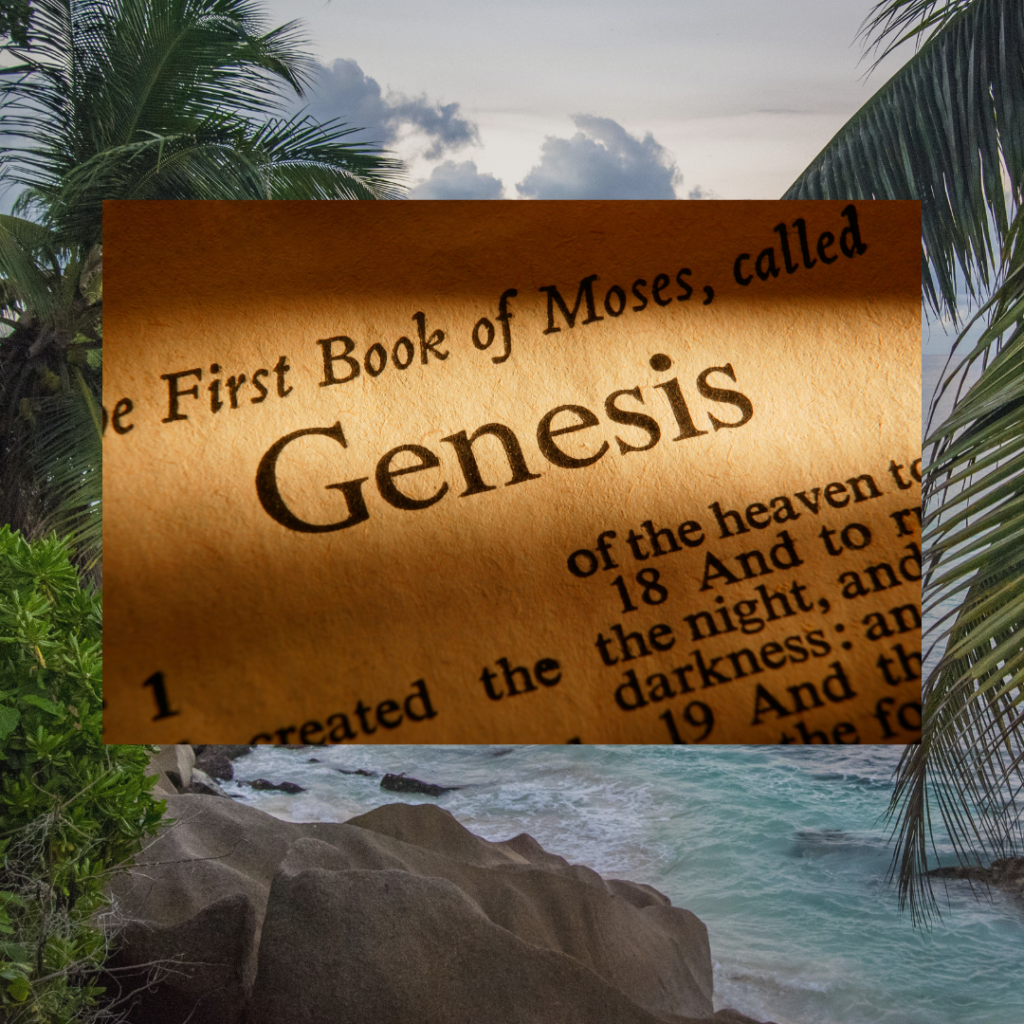
Genesis 1
1:1 In the beginning God created the heaven and the earth.
1:2 And the earth was without form, and void; and darkness was upon the face of the deep. And the Spirit of God moved upon the face of the waters.“ (“The King James Version of the Bible: Genesis”)
“The King James Version of the Bible: Genesis.” Gutenberg.org, www.gutenberg.org/cache/epub/10/pg10-images.html. Accessed 25 Oct. 2022.

In the Ancient Greek Creation Story, Chaos was in the world before Earth was created, and the Primordial Deity Gaea was the Earth that was created “in the beginning.”
Napoli, Donna Jo, and Balit. Treasury of Greek Mythology: Classic Stories of Gods, Goddesses, Heroes and Monsters. National Geographic Society, 2011.
Note that Gaea is also spelled Gaia.
Gaea was the first Ancient Greek goddess to be created, and she was somehow born out of the Chaos that was already in the world before she was born. From within herself, Gaea gave birth to Uranus, who would become her firstborn and also her first mate. Note: This creation of Uranus reminds me of the Biblical creation of Eve from Adam’s rib
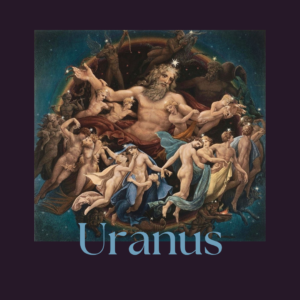
Uranus was the Primordial god of the Sky, and in illustrations, he is often placed in a dome-like position hovering over Gaea.
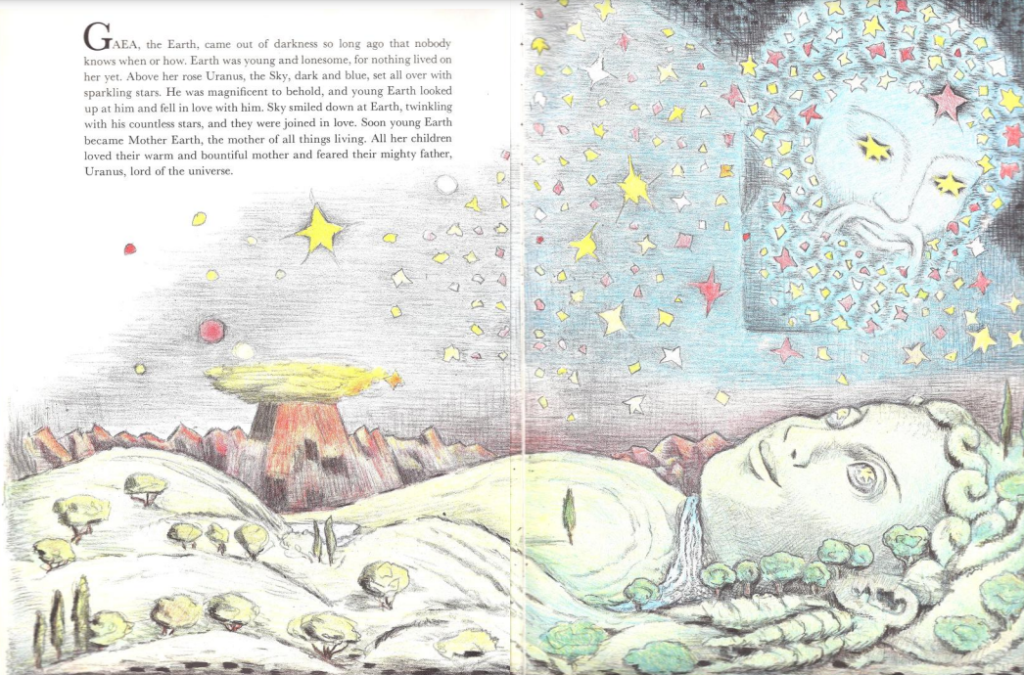
D’Aulaire, Ingri, and Edgar Parin D’Aulaire. D’Aulaires Book of Greek Myths. New York, United States, Penguin Random House, 1992.
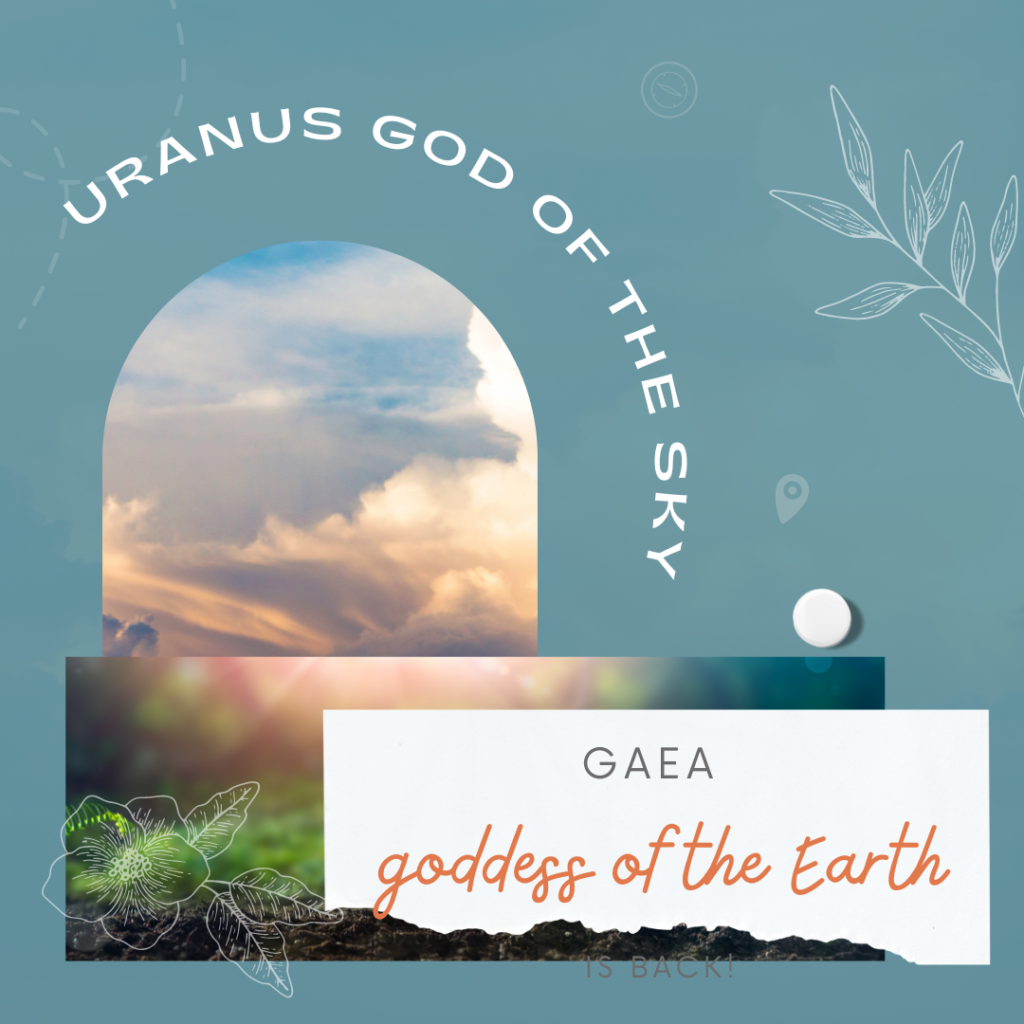
Uranus was like the Heavens comparable to what is mentioned in Genesis 1:1, and Gaea was the Earth.

As we continue this discussion, consider that in any photograph of a natural horizon, the sky is above the earth or the sea. In many cases, mythology is a result of the stories that people tell themselves, as they seek to understand why things are–as they are. In the myths about Uranus, he is initially locked in this position, and because of his closeness to her, Gaea’s children cannot be born. They were trapped inside her.Gaea’s unborn son Cronus escaped and castrated his father [Uranus}, Uranus flinched, thus pulling himself away from or separating from Gaea. The Biblical account of the creation also mentions the fact that God separated the earth and the sky–later, after they occur in the story. See Genesis 1:4.
In Greek mythology, Chaos was like the deep formlessness mentioned in Genesis 1:2, and Erebus was the pervasive and primordial Darkness. (“The King James Version of the Bible: Genesis”)
The Ancient Greeks believed that their world was surrounded and encased within the Great River Oceanus. The Ancient Greeks also believed in several other aquatic gods and goddesses. Oceanus was the primordial stream that was there “in the beginning.”
Genesis also tells us that “in the beginning,” the world was watery. Genesis 1: 2
“And God said, Let there be light: and there was light.” Genesis 1: 3 (“The King James Version of the Bible: Genesis”)
Genesis tells us that on the first day of Creation, a type of light was created. This light was not the same as the sun or the moon. It was not even day. Those were created later–both in Ancient Greek Mythology and in the Genesis account. The light created on the first day was merely light: “Let there be light.” Genesis 1:3. I believe that the first light that was created was comparable to the primordial Aether in Greek mythology.
In Ancient Greece, the primordial deity Aether was a diffuse, misty light that was different from the Sun, Moon, and Stars that appeared later as gods and goddesses. In Genesis, the Sun, Moon, and Stars were also created later in the Biblical Story of Creation.
“And God saw the light, that it was good: and God divided the light from the darkness.” Genesis 1:4 (“The King James Version of the Bible: Genesis”)
“And God called the light Day, and the darkness he called Night. And the evening and the morning were the first day.” Genesis 1:5. (“The King James Version of the Bible: Genesis”)
It is good to distinguish the fact that in Greek mythology, the Darkness of the primordial world was not the same thing as Night. In Genesis, Night was created on the first day, but Night was not the same as the primordial Darkness which was there, before “the beginning.”
1:1 “In the beginning God created the heaven and the earth.
1:2 “And the earth was without form, and void; and darkness was upon the face of the deep.” (“The King James Version of the Bible: Genesis”)
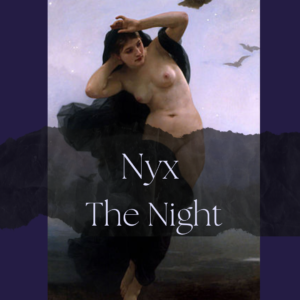
In Greek Mythology, Nyx was the Primordial Deity of the Night. Nyx was a type of Darkness, but she was not the same Darkness as Erebus, which was a primordial darkness. Night changes to Dawn cyclically. Erebus was a more constant Darkness. It is interesting, however, that Erebus and Chaos were the parents of Nyx. Certainly, Nyx was not created at the same time that Gaea and Uranus (Earth and the Sky) were created. She came along later.
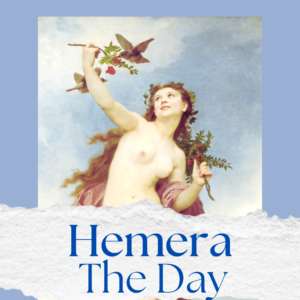
Hemera was the Primordial Day. Nyx was her mother and Erebus was her father. Again, Day came along after the Sky and the Earth.
The First Day in Genesis
- Genesis 1
- 1:1 “In the beginning God created the heaven and the earth.
1:2 “And the earth was without form, and void; and darkness was upon the face of the deep. And the Spirit of God moved upon the face of the waters.
1:3 “And God said, Let there be light: and there was light.
1:4 “And God saw the light, that it was good: and God divided the light from the darkness.
1:5 “And God called the light Day, and the darkness he called Night. And the evening and the morning were the first day.”
(“The King James Version of the Bible: Genesis”)
______________________________
On the second day of the Creation Story in Genesis, God created a sky that was not the same sky as the Heavens that he created on Day 1. As I mentioned before, God separated the Sky and the Earth Genesis 1: 6-8.
1:6 “And God said, Let there be a firmament in the midst of the waters, and let it divide the waters from the waters.
1:7 “And God made the firmament, and divided the waters which were under the firmament from the waters which were above the firmament: and it was so.
1:8 “And God called the firmament Heaven. And the evening and the morning were the second day.”
(“The King James Version of the Bible: Genesis”)

- Again, in Greek Mythology, the Sky and the Earth were originally locked together, but later, they were also divided.
In the same way that the world has more than one kind of Darkness, it also has more than one kind of Sky. Uranus was the Primordial Sky, and he was the first King of the Ancient gods and goddesses. A couple of generations later, his grandson Zeus was born, and Zeus became the greatest god of the sky. He was the greatest of all the Ancient Greek gods and goddesses.
Jupiter Enthroned, Heinrich Friedrich Füger, turn of the 18th and 19th centuries, From the collection of: Museum of Fine Arts, Budapest
Jupiter was the Roman name of the Greek god Zeus, who was the supreme Olympian god. The Olympian gods and goddesses were of the second order of Ancient Greek gods and goddesses. Developmentally, they were of a higher order than the Titan gods and goddesses who came before them. But the Titan gods and goddesses came first.
The parents of Zeus were the Titan god Cronus and the goddess Rhea, who were the children [sister and brother] of the primordial deities Gaea and Uranus. Cronus dethroned his father Uranus, and he became King after him. Zeus dethroned his father Cronus, and he became King after him. Zeus was the greatest of all the kings of the Ancient Greek gods and goddesses.
__________________________
Day Three in the Biblical Creation Story:
1:9 “And God said, Let the waters under the heaven be gathered together unto one place, and let the dry land appear: and it was so.
1:10 “And God called the dry land Earth; and the gathering together of the waters called he Seas: and God saw that it was good.
1:11 “And God said, Let the earth bring forth grass, the herb yielding seed, and the fruit tree yielding fruit after his kind, whose seed is in itself, upon the earth: and it was so.
1:12 “And the earth brought forth grass, and herb yielding seed after his kind, and the tree yielding fruit, whose seed was in itself, after his kind: and God saw that it was good.
1:13 “And the evening and the morning were the third day.”
(“The King James Version of the Bible: Genesis”)
On the third day of the Biblical Creation Story, God created seas and fertile land.
- 1:9 “And God said, Let the waters under the heaven be gathered together unto one place, and let the dry land appear: and it was so.” (“The King James Version of the Bible: Genesis”)
The Dispute of Minerva and Neptune by René-Antoine Houasse (circa 1689 or 1706)
Poseidon was the Ancient Greek Counterpart to the Ancient Rome god Neptune.
The Ancient Greek counterpart to Minerva was Pallas Athena, who was often only called Athena.
In Ancient Greek Mythology, Poseidon was the god of the Seas. The parents of Poseidon were Cronus and Rhea, who were siblings. Their parents were Uranus and Gaea.
- 1:10 “And God called the dry land Earth; and the gathering together of the waters called he Seas: and God saw that it was good.” (“The King James Version of the Bible: Genesis”)
Demeter was the Ancient Greek goddess, who I believe was comparable to the dry “land” that God created in Genesis 1:10. The Ancient Greek god Poseidon was comparable to the “seas.”
- Genesis 1:11-13
- 1:11 “And God said, Let the earth bring forth grass, the herb yielding seed, and the fruit tree yielding fruit after his kind, whose seed is in itself, upon the earth: and it was so.1:12 “And the earth brought forth grass, and herb yielding seed after his kind, and the tree yielding fruit, whose seed was in itself, after his kind: and God saw that it was good.1:13 “And the evening and the morning were the third day.”
- (“The King James Version of the Bible: Genesis”)
In the same way that a different degree of light and darkness was created on different days in Genesis, there are also different types of darkness and light in Greek Mythology. The same is true about the goddesses of the earth.
Demeter was the Ancient Greek goddess of agriculture. She was a goddess of the land who was not the same as Gaea, who was Mother Earth.
Demeter and Zeus were brother and sister. Gaea was the grandmother of both of them.
On the fourth day of the Biblical account of the Creation Story, God created the sun, the moon, and the stars. During the daytime, the Sun is the immense light source and the Moon and the Stars are the Lights of the Night.
1:14 And God said, Let there be lights in the firmament of the heaven to divide the day from the night; and let them be for signs, and for seasons, and for days, and years: 1:15 And let them be for lights in the firmament of the heaven to give light upon the earth: and it was so.
1:16 And God made two great lights; the greater light to rule the day, and the lesser light to rule the night: he made the stars also.
1:17 And God set them in the firmament of the heaven to give light upon the earth, 1:18 And to rule over the day and over the night, and to divide the light from the darkness: and God saw that it was good.
1:19 And the evening and the morning were the fourth day.
(“The King James Version of the Bible: Genesis”)
In Ancient Greek Mythology, Helios was the Sun god. his siblings were Selene, the Moon, and Eos, the Dawn.
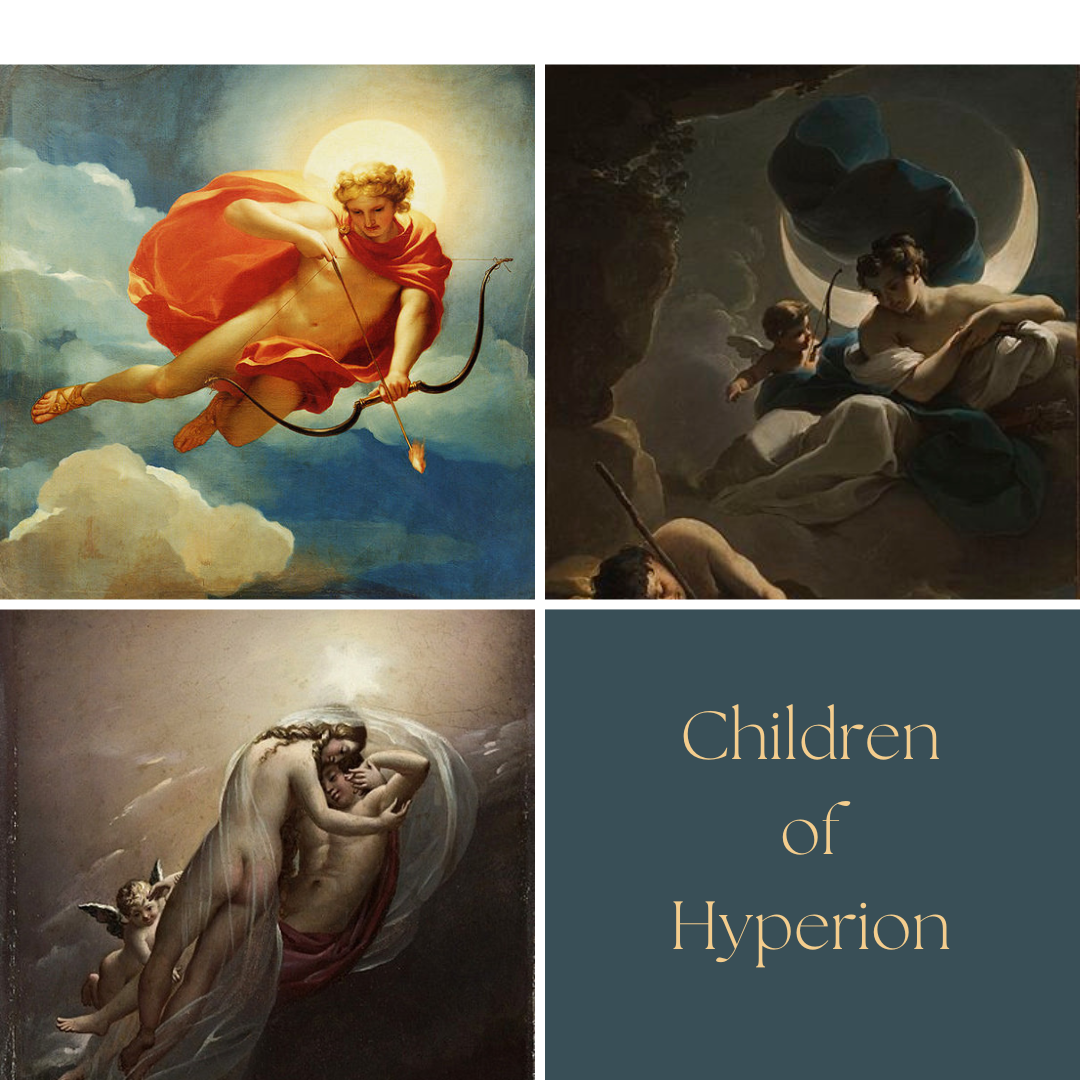
- 1:14 “And God said, Let there be lights in the firmament of the heaven to divide the day from the night; and let them be for signs, and for seasons, and for days, and years:”
(“The King James Version of the Bible: Genesis”)
The seasons are a result of the sun’s altering position in relationship to the earth. In that respect, the Ancient Greek god Hyperion and his children are of utmost importance in any account of The Creation.’
The Rape of Orithyia by Boreas by Peter Paul Rubens – Painted in 1620
In terms of Seasons, Boras was the Ancient Greek god of winter and the North Wind.

The Fate of Persephone, 1877 (oil & tempera on canvas) by Crane, Walter (1845-1915); 122.5×267 cm; Private Collection; (add.info.: Queen of the Underworld; Goddess of Spring;); Photo © Christie’s Images;
The Story of the Creation of the Seasons in Ancient Greek Mythology is discussed in the following video:
In Ancient Greek Mythology, Persephone was the goddess of the Spring. Her parents were Zeus and his sister Demeter.
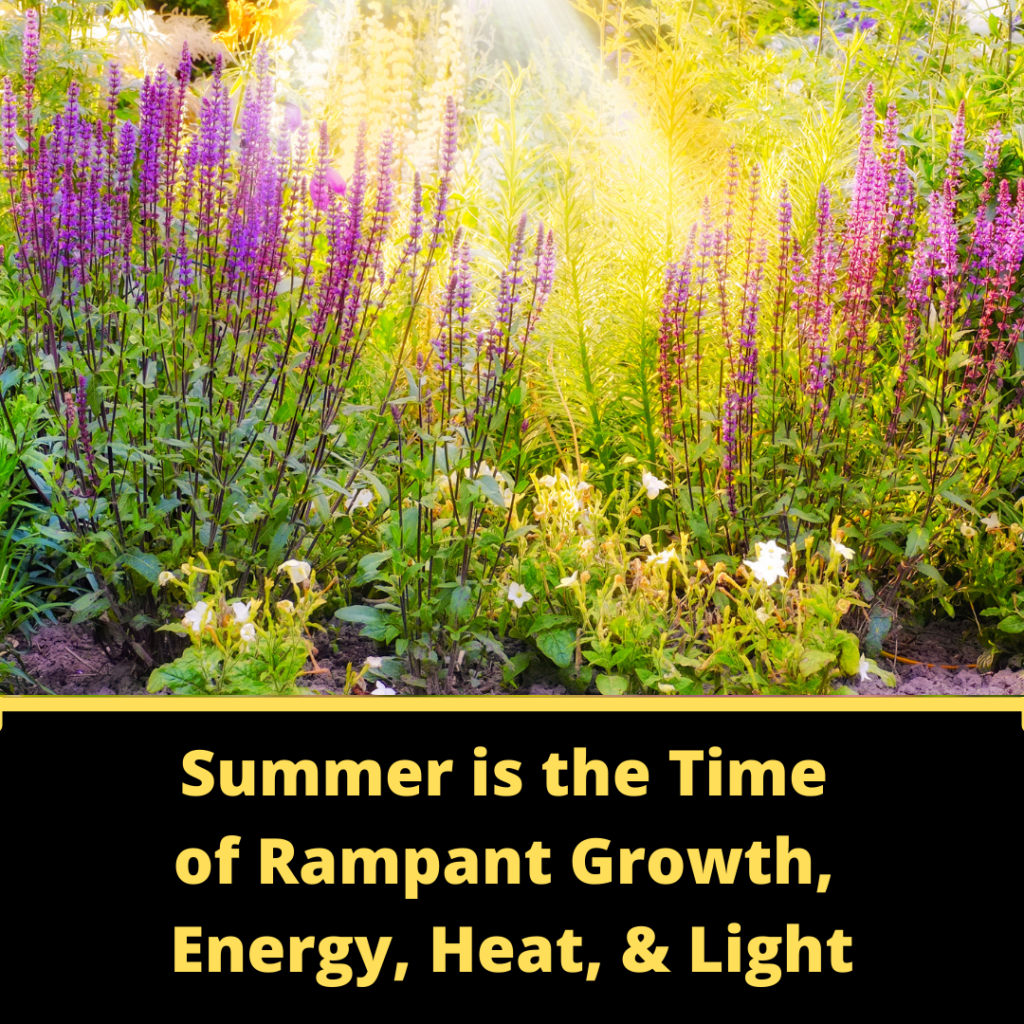
“Apollo and the Hours” by Georg Friedrich Kersting (1822).
In Ancient Greek Mythology, the Hours–or the Horae–represented 2 of the Season Auxa ws the Horae Summer.
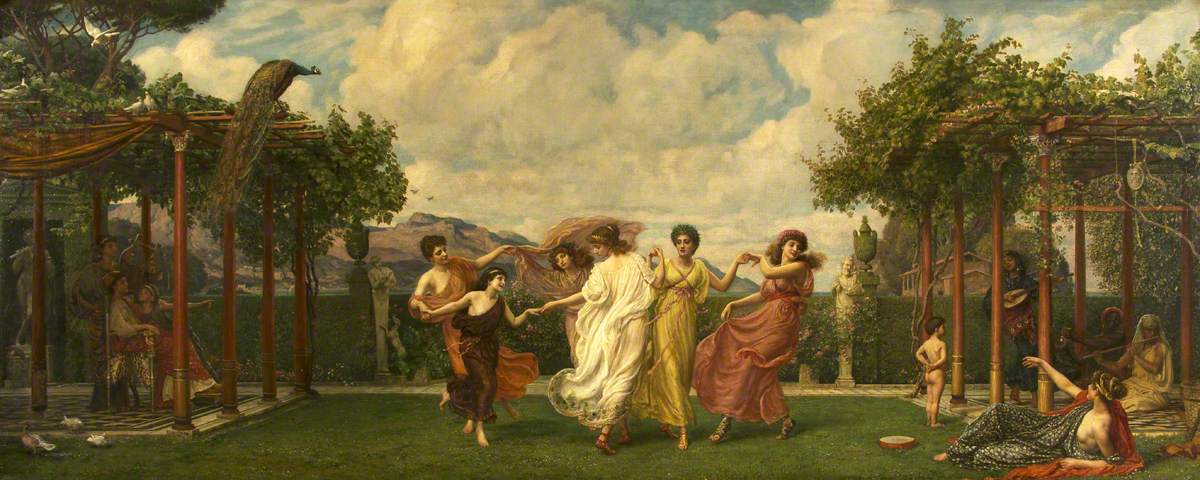
Horae Serenae by Edward John Poynter – Painted in 1896
In Ancient Greek Mythology, Autumn is depicted by the Horae Carpo.
The Horae or the Hours suggest something important about the Seasons in Ancient Greek Mythology. Like the hours on a clock’s dial, the Horae represent Time on the Wheel of Time.
____________________________
On the fifth day of the Biblical Account of the Creation Story, God created the aquatic creatures and birds.
- 20
- And God said, “Let the water teem with living creatures, and let birds fly above the earth across the expanse of the sky.”
- 21
- So God created the great creatures of the sea and every living and moving thing with which the water teems, according to their kinds, and every winged bird according to its kind. And God saw that it was good.
- 22
- God blessed them and said, “Be fruitful and increase in number and fill the water in the seas, and let the birds increase on the earth.”
- 23
- And there was evening, and there was morning–the fifth day.
(“The King James Version of the Bible: Genesis”)
Glaucus and Scylla by Bartholomeus Spranger – Painted between 1580 and 1582,
Glaucus was part man and part fish.
On the 5th day of the Biblical Creation Story, God created the fish and the birds. On the 6th day, he created the land animals and people.
It seems that on Day 5, God was paving the way for creating the man-like animals, which he did create on Day 6, when he also created mankind.
People came along later in the Creation Story of the Ancient Greeks, too. There are also several stories about creatures that were half-people and half-animals
Discover more from Jacki Kellum
Subscribe to get the latest posts sent to your email.